What Matters Now to Yad Vashem head Dani Dayan: Warsaw Ghetto Jews were divided, too
Performing a delicate balancing act, former politician polices world leaders’ rhetoric, protects against historical distortion and plans to open a new education center in Germany
Welcome to What Matters Now, a weekly podcast exploration into one key issue shaping Israel and the Jewish World — right now.
This week, like every week, antisemitism has captured media headlines around the world, ranging from “‘Death to the Jews’ chants heard at Berlin rally” to “Bone-chilling antisemitic display in Poland sparks condemnation.”
These modern iterations of antisemitism are, of course, of concern to Israel’s national Holocaust memorial museum Yad Vashem. But it was yet another headline this week that caused Yad Vashem head Dani Dayan to speak out, “‘Polish propaganda’: Critics assail deal to resume Israeli youth trips to Poland.”
As a guardian against the distortion of Holocaust memory, in the past year, the Buenos Aires-born Dayan, a former head of the settler movement and a past consul general to New York, has spoken up in several other cases, including when Hungarian Prime Minister Viktor Orban made comments this summer that evoked Nazi ideology.
Speaking with The Times of Israel on Thursday, Dayan says he sees results.
This week, days before Israel marks Yom Hashoah, the national Holocaust memorial day, we ask Yad Vashem head Dani Dayan, what matters now?
The following transcript has been lightly edited.
The Times of Israel: Dani, thank you so much for letting me join you in your Jerusalem Yad Vashem office. It’s raining outside — a beautiful winter day in spring. And I ask you, after a week in which we’ve heard antisemitic chants in Berlin, we saw a hugely anti-Israel basketball game in Greece, in which we have a new deal, perhaps, with Poland for school trips. In this action-packed week, what matters now?
Dani Dayan: Well, first of all, that we are approaching Yom Hashoah, and that gives context to all those things that you just mentioned. And this year, on Yom Hashoah the annual theme is eighty years since the Warsaw Ghetto Uprising and Jewish heroism during the Shoah. And I cannot fail to remember every single time I think about it, that even in the depths of the Warsaw Ghetto, there were two Jewish underground organizations. One, let’s call it left wing, led by Mordechai Anielewicz, the other, let’s call it the right wing, led by Paweł Frenkiel. And even in the ghetto, they weren’t able, because of their ideological or alleged ideological differences, to unite forces.
And this is a lesson very relevant to these days when Israel is confronting antisemitism, but also quite mighty adversaries, enemies inside its boundaries and even beyond. And there is a very worrying wedge in Israeli society.
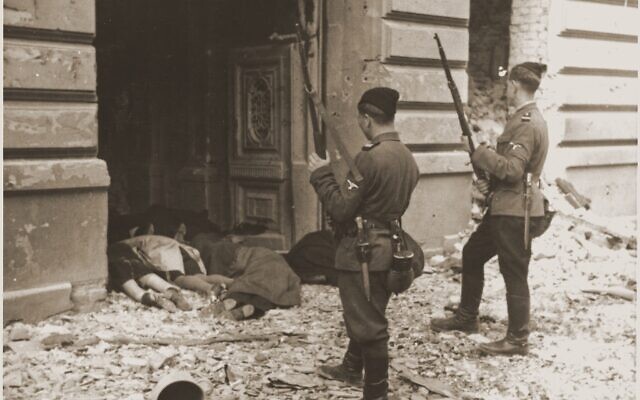
So you’re telling Israelis to take note of the wedge that was in the Warsaw Ghetto. And do you think that things would have happened differently had the Jewish forces been aligned?
No, of course not. The Warsaw Ghetto Uprising was a way to die honorably. But the situation, of course, now is completely different. I’m not making any comparison of the circumstances in the ghetto, the circumstances in independent, sovereign, regional power, Israel, but the lesson is the same.
It’s a lesson, obviously, that we’ve heard since biblical times over and over and over. You, of course, were in politics, and now you’re heading a nonpartisan institution. But do you see that this lesson will ever be learned?
I hope so. We should educate, we should tell the stories that are relevant even from the dark days of the Shoah — again, without comparing the situation of the Jewish people then to the situation of the Jewish people now, which are completely different. But in this respect, I think it’s equivalent.
As I just said, you’re the head of a nonpartisan, nonpolitical organization. And yet throughout the past year and some since we last spoke — we spoke last year before International Holocaust Remembrance Day — you have come out with some very strong statements which are not politically aligned, but are very forceful in the name of the State of Israel. One example, I would say is, of course, what happened this past week in terms of the Poland school trips in which Yad Vashem — you, I assume, signed off on this, or said it yourself — came out very forcefully against this new draft agreement.
I want to be much more accurate, much more nuanced to what you just said. The agreement has an annex. The annex is a list of recommended sites. I understand that those are recommended by the Polish side that Israeli students should visit at least one of them on the list. In that annex, there are indeed a few problematic institutions that shouldn’t be there.
But on the practical side, it makes no difference. No Israeli student, I foresee, will visit those places. And in fact, if we are talking realpolitik, the missions, the trips that took place before the COVID pandemic will be exactly the same as those that will take place now.
So I would say in the formal, in the declarative aspect, yes, we see a problem. In the practical side of things, we don’t see a real issue. And if we are posed with the dilemma, what is preferable, to have those trips with that problematic declaration or not, I think it’s a good thing we’re going to have those trips.
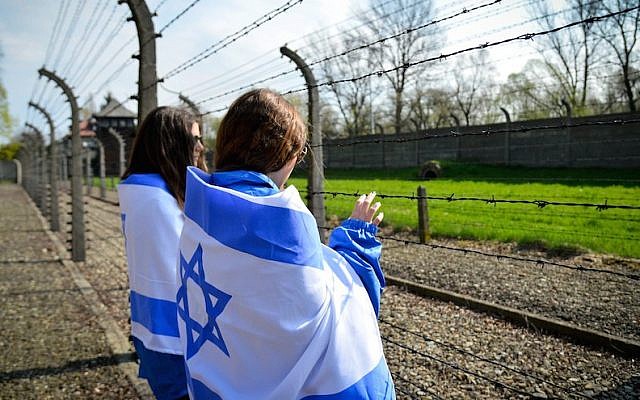
You think exposing Israeli teens to the trauma of the Holocaust, on the sites of the Holocaust is a good thing? I wonder, as a mother, if it’s a good thing.
Well, when you use the word trauma, you imply that they will come back traumatized? I don’t think so. I think that if the trips are carried out with the proper preparation, as we at least in Yad Vashem do, with the trips that we send, even of youngsters, of high school students. With the proper preparation, with the proper context, with the proper guidance on site, those are not traumatizing, but highly educating trips.
And right now we’re of course, in a situation in which many, many Holocaust survivors are leaving us at a rapid pace. And do you feel like these trips will fill the vacuum of that first-person testimony?
We are really in a watershed moment in Holocaust remembrance. We are, indeed, as you said, approaching rapidly, unfortunately, but also inevitably, the post-survivor era, the post-witness era. In that case, our task in Holocaust remembrance will be, on the one hand, much more challenging, much more difficult, and on the other hand, much more important, much more vital. I fear when that occurs, when we get to that stage, it will be the “happy hour” of the deniers and the distortionists. And we will need a myriad of tools to confront that.
The trips to the death camps in Poland are one of those means, but definitely not the only one. We will have to be much more creative, much more ingenious in doing that. But that said, I never forget that 6 million Jews never had the privilege to sit down in front of a camera and give their testimony because they did not survive. And therefore we continue and even strengthen our gathering of documentation from archival sources we have today in Yad Vashem, by far the largest archive in the world in Holocaust-related documentation, with more than 220,000,000 pages of documents, tens of thousands of artifacts and photographs, et cetera.
But we continue because, as I said, those are the testimonies of those that did not survive. Our last achievement, partially in following my meeting with Pope Francis in the Vatican, was that the Church, the Catholic Church, opened for the first time in history, their archives in the relevant period for our researchers.
The Catholic Church has opened its archives. Other countries are increasingly closing their archives, at least symbolically. Poland, for instance.
First of all, before I tackle the Polish issue, actually, the archives that are unfortunately close to us are the Russian archives. By the way, quite amazingly, the Ukrainian archives, we still continue to receive copies of documents from the Ukrainian archives, even under the current situation. Unfortunately, that is not the case regarding the Russian Federation archives. And that’s a pity.
Regarding Poland, well, yes, we know the fact that the legislation and the limitations that exist in Poland regarding Holocaust research, and we don’t accept them, obviously.
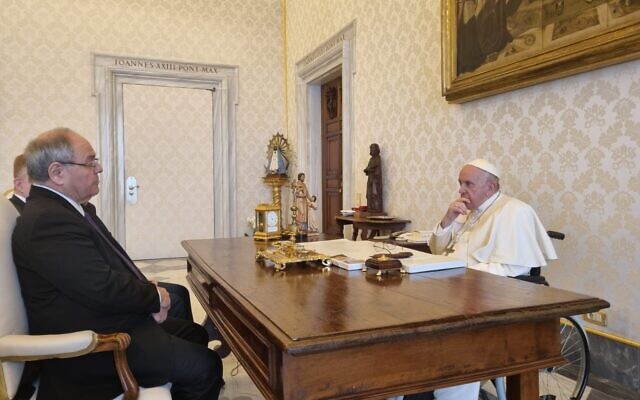
You said that the archive from Russia is closed. That surprises me. I actually didn’t know that because Russians are so proud of their role in liberating Holocaust survivors. Why do you think it’s closed still?
Regarding Russia, we see also problematic tendencies in the Russian education system regarding the Holocaust. We see, in some senses, withdrawal to the Soviet era kind of education regarding the Great Patriotic War, including the Holocaust. That disturbs us. But we are monitoring it quite closely.
Let’s talk a little bit more about Russia and Ukraine and the use of Nazi imagery that during the beginning part of the war, the end of February, March, it was so rampant all over social media, all sorts of images, memes painting the other as the Nazi. Why do you think this is still such a touchstone for both of these people? Why this use?
Because the Shoah, the Holocaust is still relevant. And I think it’s even more relevant now than ever. I must say that what they call sometimes Holocaust awareness or interest in the Shoah, in the Holocaust is growing and not diminishing as time passes. And one of the negative examples is the use of, as you said, of Shoah imagery and terminology in the propaganda war between Russia and Ukraine, mainly in the Russian side. But Ukrainians are not exempt of that blame.
I had two altercations with the Russians in following two problematic statements of Foreign Minister Sergey Lavrov. In one case, I believe the Kremlin spokesperson attacked me but also invited me to visit Donbas to see for myself the alleged atrocities committed by the Ukrainians. In another case, I had quite a heated exchange of messages with a very senior Russian diplomat.
One of the things that was said, if I’m not mistaken, is that Hitler had Jewish roots?
Exactly. That’s one of the cases. And another case, Mr. Lavrov said that the West wants to implement a final solution for the Russian people like the Nazis did to the Jewish people. But also President Zelensky, a Jew himself, said in the Knesset, in his Zoom address to the Knesset members, he said that Israel should assist Ukrainian people like the Ukrainian people assisted the Jews during the war, during the Shoah.
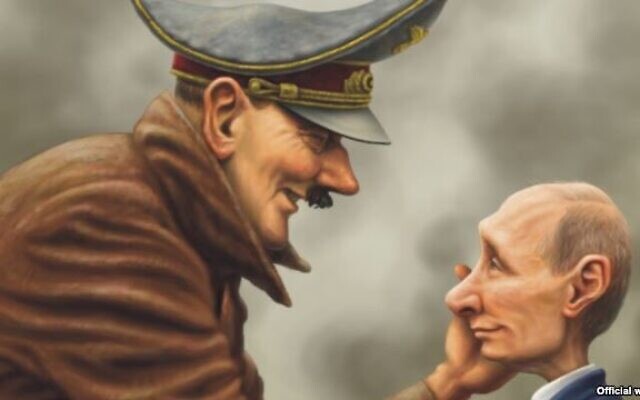
Which obviously wipes out all sorts of history.
It’s rewriting history because he doesn’t really want us to behave like the Ukrainians behave toward the Jews. I must tell you, I visited Kyiv in September 2021, before the war, for the 80th anniversary of the Babyn Yar massacre. And I opened an academic seminar, and in the presence of very senior Ukrainian officials and academics, I said, one, we welcome Ukraine into the family of democratic nations. Two, I express my gratitude that Ukraine, contrary to the Soviet Union, acknowledges the Jewishness of the victims. But I also said, three, that there is an extra mile they must go, and that is to recognize, to look into their past and recognize widespread collaboration, Ukraine’s collaboration with the Nazis.
They’ve been a bit busy since then, perhaps, and maybe that hasn’t quite happened?
Well, now they are busy with other problems. But we still see in Ukraine, like in other places, the glorification of collaborators with the Nazis that are considered in general.
You know, visiting Kyiv for a Jew with a very deep Jewish historical consciousness is a very mixed-feelings experience. On one hand, on one side, you see that they acknowledge the Jewishness of the victims in Babyn Yar, there is a synagogue in Babyn Yar and many other manifestations of that. On the other hand, I remember myself going down the steps from my hotel in Kyiv to a very beautiful square with a huge statue of Bohdan Khmelnytsky the Cossack leader, who until Hitler probably was considered the most evil antisemite assassin of Jews in Jewish exile history. So it’s a very troubling experience sometimes to be in Kyiv.
I would say that I see today in the world, in Europe, three ways of confronting their past, their respective past. I visited, for the first time in my life, two countries, Germany and Austria. At a very young age, I decided that will not visit them. But now, as chairman of Yad Vashem, I decided to do it because for the same reason I refrained — memory. I thought that I strengthened memory by doing that.
And, for instance, let’s take the Austrian case. Austria was a country that for decades after the war, had the chutzpah to define itself as the first victim of Hitler. And then they recognize wholeheartedly that they were perpetrators. They completely reject the notion of being the first victims, and they admit they were perpetrators.
In Lithuania, for instance, I met the leadership of Lithuania, also the prime minister and others, like I did in Austria. And I found, for instance, there a young and committed leadership that really wants to make things right. But I’m not sure they have the political courage to do that. And in other cases, the most extreme probably is Belarus, where they completely deny. In Belarus, they even talk about the genocide of the Belarusian people instead of the genocide of the Jews.
And let’s turn to Hungary as well. The Jobbik party that was such a rising force is now changing its tune and becoming at least less overtly antisemitic. But at the same time, we’re hearing statements from Prime Minister Viktor Orban, which you addressed last summer.
Well, yes, I must say the Urban statement that you refer to that I addressed was not exactly antisemitic. It was more about a racial tone, not necessarily against Jews. By the way, here you have a scoop: 48 hours after I criticized Mr. Orban for his statement, I had a personal letter from President Orban in my desk explaining. That shows the importance of Yad Vashem because there were many critics. I don’t think he sent personal letters to each one of them. But Yad Vashem is seen, and rightly so, as a moral beacon in this world.
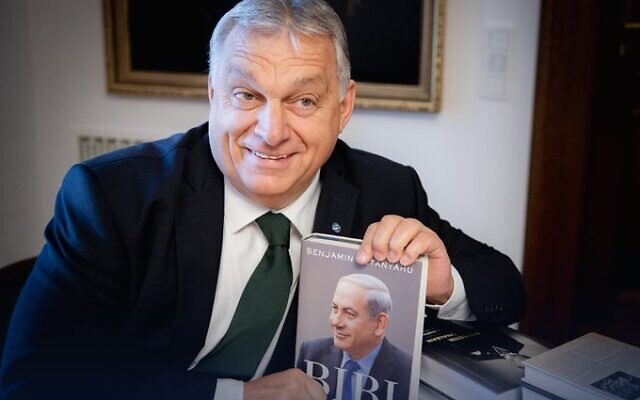
You have to choose very carefully when you speak out and when you don’t. How do you know when?
Well, I am in this business of media for many years in my different roles. I think that you acquired that instinct to know when you will overshoot. And, as I said, Yad Vashem as a beacon, as a symbol in this world, shouldn’t react to every single thing that is still said or done anywhere in the globe. But you have to understand the context and to choose carefully when to enter the arena and when not to.
Did Yad Vashem make a statement on the basketball game that happened last night? No, because why?
Well, as you said, look, it was a terrible event. I saw the film, the clips. It was terrible. It was anti-Israeli. I don’t think it was Shoah related. So no, I don’t think that. But of course, as a human being, as an Israeli, as a Jew, I condemned it wholeheartedly, if you ask. But we didn’t do that on our own initiative.
We are ahead of Yom Hashoah, as you said. And do you have any message for the many, many generations that hopefully will come from these survivors? What is their role now?
As we already spoke about approaching the post-survivor era, and the burden on the second and third generation will be huge. And I want to say a word of praise for the third generation, the grandchildren of the survivors. In many cases, obviously not in all cases, but it’s quite a pattern that in many families, the first generation, namely the survivors themselves, didn’t talk, didn’t speak about their experiences. And the second generation, their children, didn’t ask. And then came the third generation and they did ask, and the grandparents responded. So in many cases, we owe the testimonies of the survivors to their grandchildren. It is a very peculiar experience, a very peculiar phenomenon. We are very grateful to that third generation for doing that.
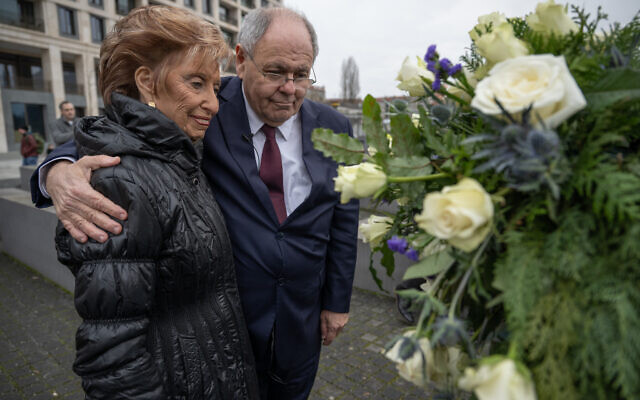
And now this fourth generation, who hopefully…
Well, fourth generation, will still have to see and to wait and see what their role will be. But, you know, if we are talking about humanity in general, mankind in general, as we spoke already, antisemitism is rising. When I came to New York to serve as Consul General of Israel in 2016, I thought that antisemitism will be in a low place in my agenda. But during my term, there are 15 Jews were murdered in antisemitic attacks. In Pittsburgh, Poway, Jersey City, Monsey. 15. So it’s clear that antisemitism, unfortunately, is raising its head again.
Now, what I tell all the leaders that visit Yad Vashem, the leaders I meet in their capitals, is that we are not in Germany of the 1930s. Thank God. We are far from it. But there is one difference between our contemporary generation, Jewish and non-Jewish, and the generation of the 1930s. And that difference is that we have the experience they didn’t have. We know it can happen. Probably they thought they burn books, that’s bad. They burn synagogues, that’s even worse. But they will never kill 6 million people. We know that antisemitism, if it’s not confronted vigorously, forcefully, immediately, undefeated, can develop into monstrous dimensions.
So we don’t have the luxury, the privilege to say, let’s wait and see how this thing develops. Leaders today have to confront antisemitism immediately and defeat it immediately, before it’s too late.
At the same time, there’s huge fatigue for the Holocaust, for instance, in Europe, definitely here in Israel, kids of my children’s generation are more tending to make jokes about the Holocaust than to treat it with any kind of serious respect. How do you combat that?
I don’t agree that there is Holocaust fatigue. I think that Holocaust awareness is rising actually in the world. I will give you two or three examples. International Holocaust Remembrance Day, January 27, didn’t exist in the 80s or the previous century. It was established this century. IHRA, the International Holocaust Remembrance Alliance, didn’t exist in the 20th century. It was established in the 21st century. A conference like the conference that the prime minister of Sweden from all places, convened in Malmo in 2021 to talk with world leaders about Holocaust remembrance, those were things that didn’t happen 20 or 30 years ago. I understand there’s going to be a follow-up conference later this year in Toledo, Spain.
So those things didn’t happen. Look, I meet leaders all over the world. In the last few months, I had the privilege to meet in their capitals the Pope and Chancellor Olaf Scholz from Germany and Chancellor Karl Nehammer from Austria and President Emanuel Macron from France and many others. And I see that this issue is in their agenda. Holocaust remembrance is today in the international agenda and we hope we help to put it there and to keep it there.
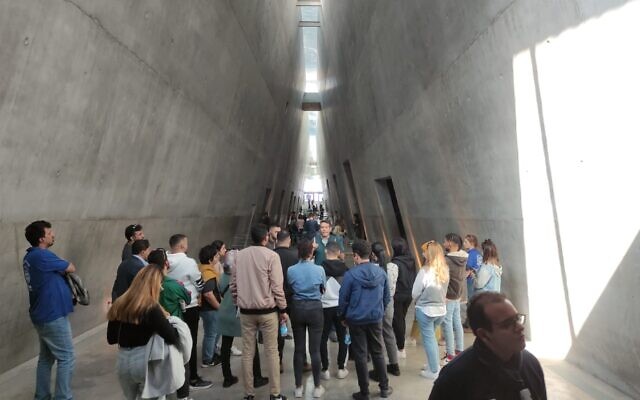
So you think that there should be some kind of trickle-down effect for the regular people?
That’s the challenge. Leadership is committed today. Does it trickle down? To a certain amount and sometimes people don’t talk enough about it because they fear crossing a line and becoming politically incorrect is how to deal with Shoah remembrance and responsibility in societies, in European societies that are becoming increasingly multiethnic and multicultural. I told both Chancellor Scholz from Germany and Chancellor Nehammer from Austria that with German or Austrian citizenship there are certain responsibilities that are linked to it even if the grandfather of the citizen was not in Germany or in Austria, but in a different continent during the war.
Say Syria, with all the refugees from the Syrian war.
Yeah. So by the way, they completely agree, and I agreed with Chancellor Scholz of Germany that the first satellite installation, the first educational center of Yad Vashem outside of Israel, will be in Germany. We will take on our shoulders the responsibility to help Germany to educate its people regarding the responsibilities that the Shoah put on their shoulders.
When is that meant to take off?
Ah, we are in an early stage. It’s a multi-year project. I hope it won’t take too long, but for sure it will take a few years.
And it’s meant to be a building or an educational project?
A building, a physical educational center. But I must tell you, all the Germans I met, the entire German leadership, chancellor, president, Bundestag president, Minister of Finance and others, and from the leader of the opposition, and all of them were thrilled about the idea and they committed to help it happen.
I’m just confused because they have so many educational resources already in Holocaust memorials, why would they need Israel to help them?
Look, in this case, unfortunately, we have a unique perspective. We are the victims. The perspective that we have is completely different when the institution that represents the victims comes to the country of the perpetrators. First of all, it’s quite a statement and it’s quite a difference from all other remembrance institutions. And we are talking specifically about education, an educational center, not a museum or not a memorial, but an educational center. I think it’s very significant.

Earlier in our conversation, you talked about your trip to Kyiv and how you welcome the country to the group of democracies in the world. Now, as you rightly said, Israel is torn asunder by this fight for democracy. Do you see that your work will be affected by this perhaps infringement upon democracy that may soon happen?
I hope not. First of all, Yad Vashem, as you said, I put the moment I came to Yad Vashem a firewall between us and anything that is political. Not on anything that is moral, but anything that is political. We need very sharp instincts to detect where is the line that crosses, that defines what is politics, or what is morality. But I hope that Yad Vashem’s values will remain unchanged whatever happens outside its walls.
Dani, thank you so much for giving me so much time today.
Thank you.
What Matters Now podcasts are available for download on iTunes, TuneIn, Pocket Casts, Stitcher, PlayerFM or wherever you get your podcasts.
Check out last week’s What Matters Now here:
There's no paywall on The Times of Israel, but the journalism we do is costly. As an independent news organization, we are in no way influenced by political or business interests. We rely on readers like you to support our fact-based coverage of Israel and the Jewish world. If you appreciate the integrity of this type of journalism, please join the ToI Community.

We’re really pleased that you’ve read X Times of Israel articles in the past month.
That’s why we started the Times of Israel eleven years ago - to provide discerning readers like you with must-read coverage of Israel and the Jewish world.
So now we have a request. Unlike other news outlets, we haven’t put up a paywall. But as the journalism we do is costly, we invite readers for whom The Times of Israel has become important to help support our work by joining The Times of Israel Community.
For as little as $6 a month you can help support our quality journalism while enjoying The Times of Israel AD-FREE, as well as accessing exclusive content available only to Times of Israel Community members.
Thank you,
David Horovitz, Founding Editor of The Times of Israel








